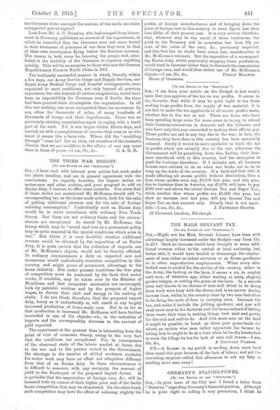THE THIRD WAR BUDGET,
[To VIII EDITOR OF mu " SPEOT■TOR."1 SIR,—I have read with interest your article last week under the above heading, and am in general agreement with the conclusions. As regards, however, the import duties on motor-cars and other articles, and your proposal to add an Excise duty, I venture to offer some remarks. You state that if these duties are maintained Mr. McKenna should add "a corresponding tax on the home-made article, both for the sake of getting additional revenue and for the sake of further reducing consumption." Undoubtedly such an Excise duty would be in strict accordance with ordinary Free Trade theory. But these are not ordinary times, and the circum- stances are exceptional. As stated by Mr. McKenna, the theory which may be "sound and true as a permanent policy may be quite unsound in the special conditions which arise in war." But whilst it is very. doubtful whether additional revenue would be obtained by the imposition of an Excise duty, it is quite certain that the reduction of imports, one of Mr. McKenna's objects, would not be thereby effected. In ordinary circumstances a duty on imported cars and accessories would undoubtedly stimulate competition in this country, and might prove of permanent advantage to the home industry. But under present conditions the free play of competition must be weakened by the facts that motor works, if available, may be taken over by the Minister of Munitions, and that competent mechanics are encouraged, both by patriotic motives and by the prospect of higher wages, to devote their skill and energy to the making of shells. I do not think, therefore, that the proposed import duty, heavy as it undoubtedly is, will result in any largely increased production of home-made cars. But in so far as that production is increased Mr. McKenna will have further succeeded in one of his objects—viz., in the reduction of imports and the corresponding decrease in the amount of gold exported.
The experiment at the present time is interesting from the point of view of economic theory, owing to the very fact that the conditions are exceptional. For, in consequence of the abnormal state of the labour market at home, due to the war and to the powers vested in the Government, the shortage in the number of skilled workmen available for motor work may have an effect not altogether different from that of an Excise duty. In these circumstances it is difficult to measure, with any certainty, the amount of yield to the Exchequer of the proposed import duties. It is probable that the importation of foreign cars, lee., will be lessened both by reason of their higher price and of the feeble home competition that may be stimulated. On the other hand, finch competition may have the effect of reducing slightly the profits of foreign manufacturers and of bringing down the price of foreign cars in this country to some figure leas than four-fifths of their present cost. It is very certain, therefore, that, whatever may be the result of those tendencies, the yield to the Treasury will be somewhat less than 331 per cent. of the value of the cars, &e., previously imported, and this fact has no doubt been taken into consideration in Mr. McKenna's estimate. But the imposition of a correspond- ing Excise duty, whilst practically stopping home production, would tend to increase rather than to diminish the importation of foreign cars, and would thus defeat one of Mr. McKenna',














































 Previous page
Previous page